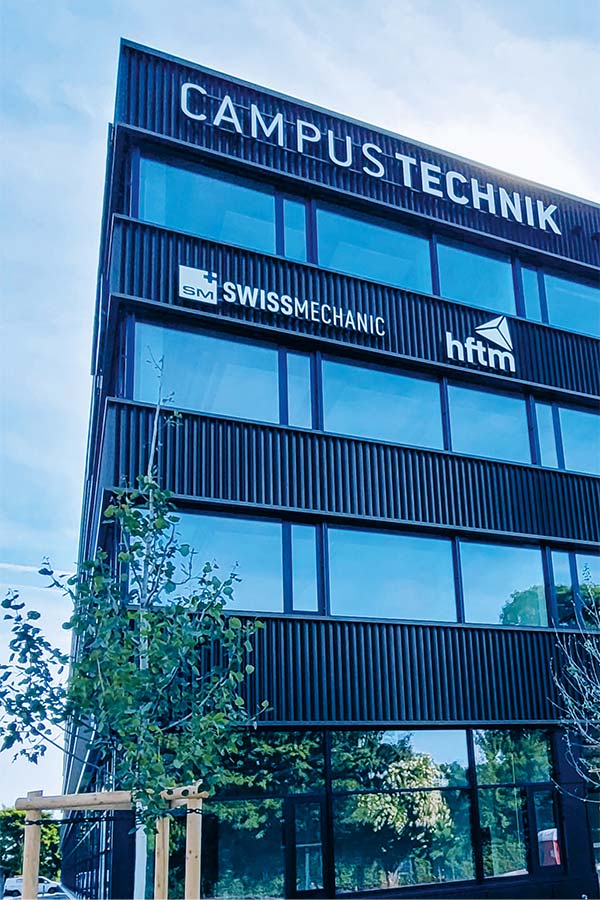The future belongs to tradespeople
For years, the technical industry has been struggling with a shortage of skilled workers. Automation, modern employer branding, and efforts to recruit young talent may help, but they will not solve the problem completely. Yet the doyen of the industry remains optimistic.
A look at the current figures confirms Thomke’s assessment. According to the Swiss Jobradar, there were 2,421 vacant polymechanic positions in Switzerland in the first quarter of 2025. These were joined by vacancies for 2,235 service technicians, 2,205 automation specialists, 1,838 mechan-ics and 1,726 machine operators. At the top of the list were nursing professionals (6,450), electricians (6,203), and carpenters (3,555).
The increasing shortage of skilled workers has also been causing concern for Eva Jaisli, chair and co-owner of PB Swiss Tools, for years. She believes that the main reason for this is demographic change, with the retirement of baby boomers and a lack of young successors. The manufacturer of tools and medical instruments in the Emmental region of the canton of Bern offers training in eight professions. Jaisli points out that they are seeing less and less interest in this, and particularly in apprenticeships to become production mechanics and polymechanics. The latter, in particular, have highly specialized know-how, so they cannot simply be recruited from abroad. “We rely on training our own skilled workers.”
This is confirmed by Enzo Armellino, CEO of Swissmechanic Solothurn, the “agile association of the SME MEM industry”. He feels that, in any case, the working environment for skilled trades has changed fundamentally. “Instead of dirty, dark workshops, there are now bright halls with modern machines. Apprentices are the skilled workers of tomorrow; much more emphasis is placed on good training today.” Of course, com-panies have automated their processes to save on personnel costs and remain competitive, adds Armellino. But highly qualified workers such as polymechanics are still needed to program, set up and operate the machines and equipment. “It’s therefore important that many young people choose to do an apprenticeship. This way, they will be able to work on the machines and generate concrete added value later on.”


Swissmechanic Solothurn offers inter-company courses and basic training for future polymechanics, production mechanics, and design engineers, as well as further education for adults. In summer 2025, the association and its educational offerings moved to the newly built Campus Technik in Grenchen. State-of-the-art machinery and innovative infrastructure, together with contemporary teaching methods, will raise training and further education to a new, practice-based level.
In addition, a workshop for the “focusMINT” program is being set up on campus. There, pupils from preschool age onwards will be introduced to the STEM subjects (science, technology, engineering, mathematics) in a way that is appropriate for their age, inspiring them to pursue careers in these fields. “We need to attract children and young people to our industry as early on as possible. There is still a lot of untapped potential, especially among girls,” says Armellino confidently. Start-ups and the Higher Technical College Mittelland (hftm), as a development partner to the business sector, will also move onto the campus. “The campus will unite the entire educational value chain and thus bring lifelong learning under one roof, making it a flagship project for the dual education system.”
Low staff turnover

Ernst Thomke is a generous patron of the Campus Technik. He financed the construction and is providing the premises on attractive terms. Given such offerings, he remains optimistic. “Tradespeople may well be assisted by AI, but they will not be replaced by it like many other professional groups. To put it bluntly, the future belongs to tradespeople as well as highly qualified mathematicians and engineers, not to bankers, lawyers, commercial employees, or accountants.”
Photos The Campus Technik in Grenchen (Switzerland) has a work-shop dedicated to the “focusMINT” program. The aim is to get children, young people, and especially girls interested in the technical sector at an early age. (Swissmem, Enzo Armellino, Alexandra Schürch

